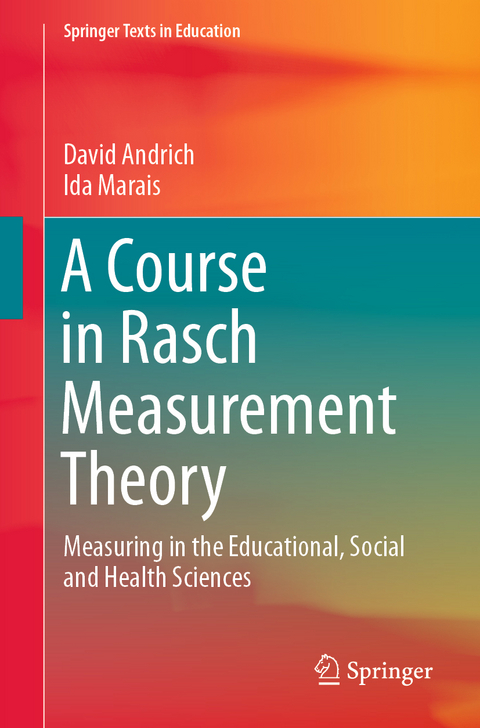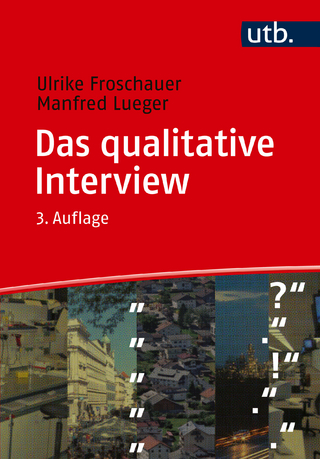
A Course in Rasch Measurement Theory
Springer Verlag, Singapore
978-981-13-7495-1 (ISBN)
The book’s main goals are to equip researchers with the confidence they need in order to be in control of the analysis and interpretation of data, and to make professional rather than primarily statistical decisions mechanically. Because statistical principles are necessarily involved, reviews of the requisite statistics are provided in the Appendix.
The content is based on courses that have been taught both online and in intensive form for over two decades. Although first principles are emphasised, much of the book is based on research conducted by the two authors and their colleagues.
David Andrich BSc, BEd (Hons.), MEd (UWA), PhD (Chic) FASSA completed degrees in Mathematics and Education before receiving a Fulbright Award for PhD study at the University of Chicago, USA, where his dissertation earned the Susan Colver Rosenberger prize for Social Sciences in 1973. He took on a position at The University of Western Australia, and in 1985 was appointed a Professor of Education at Murdoch University in Western Australia, where he also served as Dean for two terms. In 2007 he returned to The University of Western Australia as the Chapple Professor of Education. He is currently a Visiting Professor of Educational Assessment at the University of Oxford. He has held research grants from the Australian Research Council continuously since 1985 and has conducted commissioned research at the national and state levels. He was elected a Fellow of the Academy of Social Sciences of Australia for his contributions to social measurement. He is especially known for his contributions to Rasch measurement theory, where his work has ranged from the philosophy of measurement, through model exposition and interpretation, to software development. He is the author of Rasch Models for Measurement (Sage). Ida Marais BSc, (North-West), MSc, PhD (Auckland) is a Senior Research Fellow at the Graduate School of Education’s Psychometric Laboratory at The University of Western Australia. After graduating with a degree in Computer Science and Psychology, she worked as a computer analyst / programmer for a number of years before being awarded a University of Auckland doctoral scholarship and completing her MSc and PhD in Cognitive Psychology. Since then she has been a researcher and lecturer in the fields of Psychology, Health and Education in New Zealand and Australia. Her research activities focus on psychological and educational measurement, especially the measurement of change over time. Using simulation software she developed, she also studies the effects on estimates of data that violate the Rasch model.
PART A: General principles and the dichotomous Rasch model.- Chapter 1: The idea of measurement.- Chapter 2: Constructing instruments to achieve measurement.- Chapter 3: Classical test theory (CTT).- Chapter 4: Reliability and validity in CTT.- Chapter 5: The Guttman structure and analysis of responses.- Chapter 6: The dichotomous Rasch model - The simplest modern test theory model.- Chapter 7: Invariance of comparisons - Separation of person and item parameters.- Chapter 8: Sufficiency - The significance of total scores.- Chapter 9: Estimating item difficulty.- Chapter 10: Estimating person proficiency and person separation.- Chapter 11: Equating - Linking instruments through common items.- Chapter 12: Comparisons and contrasts between CTT and Rasch measurement theory (RMT).- PART B: The dichotomous Rasch model: Fit of responses to the model.- Chapter 13: Fit of responses to the model I - Item characteristic curve and Chi-square tests of fit.- Chapter 14: Violations of the assumption of independence I - Multidimensionality and response dependence.- Chapter 15: Fit of responses to the model II - Analysis of residuals and general principles.- Chapter 16: Fit of responses to the model III - Differential item functioning.- Chapter 17: Fit of responses to the model IV - Guessing.- Chapter 18: Other models of modern test theory for dichotomous responses.- Chapter 19: Comparisons and contrasts between item response theory (IRT) and RMT.- PART C: Extending the dichotomous Rasch model: The polytomous Rasch model.- Chapter 20: The polytomous Rasch model I.- Chapter 21: The polytomous Rasch model II.- Chapter 21: The polytomous Rasch model II.- Chapter 21: The polytomous Rasch model II.- Chapter 24: Violations of the assumption of independence II – The polytomous Rasch model.- Part D: Theoretical justifications and further elaborations.- Chapter 25: Derivation of CTT equations and coefficient α.- Chapter 26: Analysis of more than two facets and repeated measures.- Chapter 27: Derivation of the threshold form of the polytomous Rasch model.- Chapter 28: Non-Rasch measurement models for ordered response categories.- Chapter 29: Review of principles of test analysis using Rasch measurement theory.- Part E: RUMM2030 Exercises.- Exercise 1: Interpretation of RUMM2030 printout.- Exercise 2: Basic analysis of dichotomous and polytomous responses.- Exercise 3: Advanced analysis of dichotomous responses.- Exercise 4: Advanced analysis of polytomous responses.- Exercise 5: Analysis of data with differential item functioning.- Exercise 6: Analysis of data with dependence.- Exercise 7: Analysis of more than two facets and repeated measurements.- Exercise 8: Writing up a Rasch model analysis.- Part F: Statistics Reviews.- Statistics Review 1: Sigma notation, mean, and variance.- Statistics Review 2: Normal distribution.- Statistics Review 3: Covariance and the variance of the sum of two variables.- Statistics Review 4: Regression and correlation.- Statistics Review 5: Probability.- Statistics Review 6: Indices.- Statistics Review 7: Logarithms.- Statistics Review 8: Conditional probability.- Statistics Review 9: Independence.- Statistics Review 10: Bernoulli and Binomial variables.- Statistics Review 11: The Chi-square distribution and test.- Statistics Review 12: Analysis of variance (ANOVA).- Statistics Review 13: Distribution theory.- Statistics Review 14: Basic distributions for tests of fit.- Statistics Review 15: Odds and ratios.
| Erscheinungsdatum | 26.07.2019 |
|---|---|
| Reihe/Serie | Springer Texts in Education |
| Zusatzinfo | 61 Illustrations, color; 73 Illustrations, black and white; XIX, 482 p. 134 illus., 61 illus. in color. |
| Verlagsort | Singapore |
| Sprache | englisch |
| Maße | 155 x 235 mm |
| Themenwelt | Geisteswissenschaften ► Psychologie ► Test in der Psychologie |
| Sozialwissenschaften ► Pädagogik ► Allgemeines / Lexika | |
| Sozialwissenschaften ► Soziologie ► Empirische Sozialforschung | |
| Schlagworte | classical test theory • mathematical model • measurement and assessment • measurement in education • measurement in health sciences • measurement in psychology • Rasch measurement • Rasch unidimensional models for measurement • RUMM2030 • Social measurement • studying measurement |
| ISBN-10 | 981-13-7495-3 / 9811374953 |
| ISBN-13 | 978-981-13-7495-1 / 9789811374951 |
| Zustand | Neuware |
| Informationen gemäß Produktsicherheitsverordnung (GPSR) | |
| Haben Sie eine Frage zum Produkt? |
aus dem Bereich


